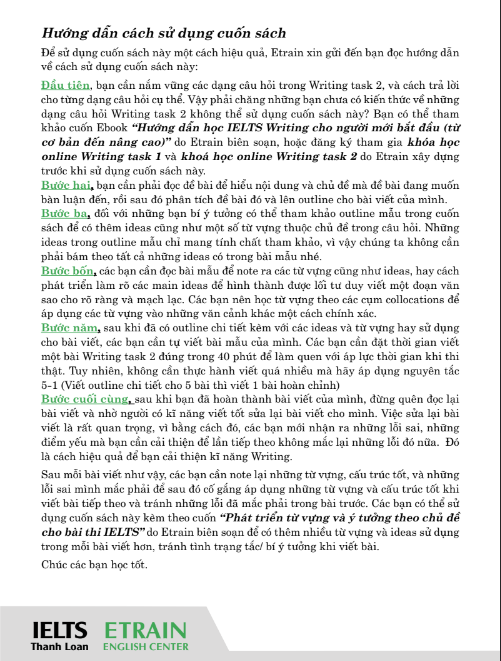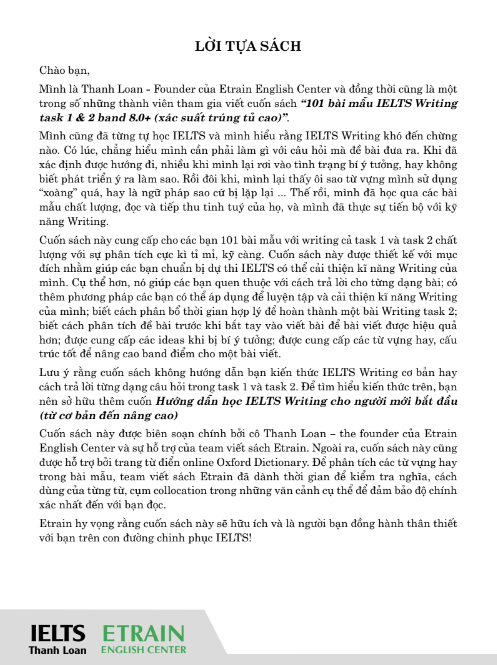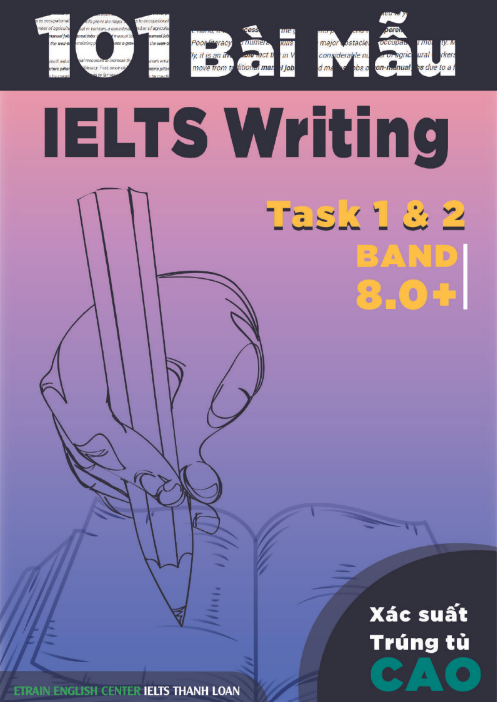


Mục lục
ToggleĐỀ THI IELTS WRITING TASK 2 – NGÀY 13/01/2018
Đề bài:
Scientific research should be carried out and controlled by the governments rather than private companies.
Do you agree or disagree?
Dịch:
Những nghiên cứu khoa học nên được thực hiện và kiểm soát bởi chính phủ thay vì các công ty tư nhân. Bạn đồng ý hay không?
Phân tích đề bài
Dạng câu hỏi: Opinion Question
Nhiệm vụ của người viết:
- Thể hiện rõ quan điểm (đồng ý, không đồng ý hoặc một phần).
- Đưa ra luận điểm và luận cứ để làm rõ quan điểm của mình.
Cấu trúc bài viết đề xuất
Introduction (Mở bài):
- Paraphrase lại câu hỏi.
- Nêu rõ quan điểm cá nhân (đồng ý rằng nghiên cứu khoa học nên do chính phủ thực hiện và kiểm soát).
Body Paragraph 1:
- Topic sentence: Nếu chính phủ kiểm soát thì quá trình thực hiện nghiên cứu sẽ hiệu quả hơn.
- Supporting idea 1: Nhiều nghiên cứu đòi hỏi sự hợp tác giữa các quốc gia, điều mà công ty tư nhân không đủ năng lực thực hiện (ví dụ: nghiên cứu về biến đổi khí hậu).
- Supporting idea 2: Chính phủ có nguồn tài chính mạnh để thực hiện nghiên cứu và xử lý các vấn đề phát sinh.
Body Paragraph 2:
- Nếu chính phủ kiểm soát, nghiên cứu sẽ hướng đến lợi ích cộng đồng.
- Ngược lại, nếu các công ty tư nhân thực hiện, họ có thể làm sai lệch mục tiêu nghiên cứu vì lợi ích cá nhân.
Conclusion (Kết luận):
- Khẳng định lại quan điểm rằng chính phủ nên chịu trách nhiệm chính trong việc thực hiện và kiểm soát các nghiên cứu khoa học.
Bài mẫu – Sample Essay
Some people enunciate the idea that governments should take responsibility for conducting and controlling scientific research. I totally concur with this view because the interference of governments will have profound impacts on the success and usefulness of it.
On the one hand, the outright control of governments over the process of carrying out research projects is of significant benefit. Firstly, every research requires an enormous amount of effort, so the cooperation of many governments of different countries is of necessity. For instance, in order to find out radical solutions to global warming, both developed and developing countries have to do research to deal with environmental problems in their own countries. The act of only private companies or small organizations is not enough. Secondly, only the government is capable of providing financial assistance to various research projects. If the project fails to achieve its objectives, the government has the resources to cope with the losses incurred.
On the other hand, the main motive of the government in conducting research is public welfare. If a scientific project is funded and managed by private companies, its credibility would suffer. Pharmaceutical companies, for example, tend to provide financial support for clinical trials that bring benefits to their marketing strategies so as to maximize their profit. Without government control, some companies could carry out illegal research related to nuclear weapons or unethical human experimentation, which poses a serious threat to society.
In conclusion, I agree with the idea of putting the scientific research process under government control so that its success, accuracy, and applicability can be ensured.
Giải thích từ vựng – Vocabulary Explanation
| Từ / Cụm từ | Nghĩa tiếng Việt | Giải thích / Ví dụ |
|---|---|---|
| Profound impacts (noun phrase) | Tác động sâu sắc | A powerful effect that something new has on a situation or person. Ex: The increase in the number of young people working in cities has had a profound impact on village life. |
| Outright (adj) | Ngay lập tức, hoàn toàn | Completely or immediately. Ex: Cigarette advertising should be banned outright. |
| Be of significant benefit (phrase) | Mang lại lợi ích đáng kể | To have many advantages; to be beneficial. |
| Be of necessity (phrase) | Cần thiết | The need for something. |
| Radical solution (noun phrase) | Giải pháp triệt để | The ultimate answer to a problem. Ex: Governments should find radical solutions to urban pollution. |
| Be capable of (phrase) | Có khả năng làm gì | Able to do things effectively and achieve results. Ex: Only the government is capable of running such large projects. |
| Enunciate (verb) | Thể hiện, đưa ra | To express or explain clearly. Ex: The leader enunciated his party’s tax reform plans. |
| Concur with (verb phrase) | Đồng tình, nhất trí | To agree or have the same opinion. Ex: The new report concurs with previous findings. |
| Financial assistance (noun phrase) | Hỗ trợ tài chính | Help in providing money. Ex: The company needs more financial assistance from the government. |
| Achieve objectives (verb phrase) | Đạt được mục tiêu | To accomplish planned goals. |
| Public welfare (noun phrase) | Phúc lợi công cộng | Community benefits; social well-being. |
| Credibility (noun) | Sự đáng tin cậy | Believability; reliability. |
| Financial support (noun phrase) | Hỗ trợ tài chính | Assistance in the form of funding. |
| Marketing strategies (noun phrase) | Chiến lược kinh doanh | Detailed plans for promoting or selling products. |
| Without government control (phrase) | Không có sự kiểm soát của chính phủ | Without supervision or regulation from authorities. |
| Carry out illegal research (verb phrase) | Tiến hành nghiên cứu phi pháp | To implement research that violates the law. |
| Nuclear weapons (noun phrase) | Vũ khí hạt nhân | Weapons that use nuclear energy to cause destruction. |
| Unethical human experimentation (noun phrase) | Thí nghiệm phi đạo đức trên người | Research or testing on humans without moral or legal justification. |
| Pose a serious threat to (verb phrase) | Gây ra mối đe dọa nghiêm trọng | To create danger or harm. Ex: Pollution poses a serious threat to public health. |
| Applicability (noun) | Khả năng ứng dụng | The relevance or usefulness of something in practice. |
Tổng kết ý chính:
Bài viết này thể hiện rõ quan điểm đồng ý rằng chính phủ nên chịu trách nhiệm trong việc thực hiện và kiểm soát các nghiên cứu khoa học, bởi vì:
- Chính phủ có năng lực tài chính và tầm ảnh hưởng quốc tế để triển khai nghiên cứu lớn.
- Các nghiên cứu do chính phủ thực hiện sẽ hướng đến phúc lợi cộng đồng, tránh các mục tiêu vì lợi nhuận riêng của doanh nghiệp.
- Sự giám sát của chính phủ giúp đảm bảo tính đạo đức và an toàn của nghiên cứu.
ĐỀ THI IELTS WRITING TASK 2 NGÀY 03/02/2018
Đề bài:
The only way to improve road safety is to give much stricter punishments on driving offenses.
To what extent do you agree or disagree?
Có thể bạn cũng muốn đọc thêm các cuốn sách tiếng Anh sau:
Dịch:
Cách duy nhất để cải thiện an toàn giao thông là áp dụng các hình phạt nghiêm khắc hơn cho các hành vi vi phạm giao thông.
Bạn đồng ý hay không đồng ý với ý kiến này?
PHÂN TÍCH ĐỀ BÀI
Dạng câu hỏi: Opinion question
Người viết cần:
- Thể hiện rõ ràng quan điểm (đồng ý / không đồng ý / một phần).
- Đưa ra luận điểm và ví dụ cụ thể để chứng minh.
Gợi ý triển khai:
Introduction:
- Paraphrase lại câu hỏi.
- Đưa ra quan điểm rõ ràng (ví dụ: Không hoàn toàn đồng ý, vì ngoài việc phạt nặng, còn có những cách khác để cải thiện an toàn giao thông).
Body Paragraph 1:
- Topic sentence: Việc áp dụng hình phạt nghiêm khắc có thể giúp giảm vi phạm.
- Supporting idea 1: Người lái xe sợ bị phạt nên sẽ cẩn trọng hơn.
- Supporting idea 2: Ở các quốc gia có luật nghiêm (như Singapore), tỷ lệ tai nạn thấp hơn đáng kể.
- Example: Singapore áp dụng phạt nặng khi vượt đèn đỏ hoặc sử dụng điện thoại khi lái xe, khiến người dân tuân thủ luật tốt hơn.
Body Paragraph 2:
- Topic sentence: Tuy nhiên, chỉ dựa vào hình phạt là chưa đủ.
- Supporting idea 1: Cần nâng cao nhận thức cộng đồng qua giáo dục và tuyên truyền.
- Supporting idea 2: Cải thiện cơ sở hạ tầng, hệ thống biển báo và chiếu sáng đường bộ cũng góp phần lớn.
- Example: Ở Nhật Bản, ngoài việc có luật nghiêm, chính phủ còn đầu tư đường xá và giáo dục công dân từ nhỏ về ý thức tham gia giao thông.
Conclusion:
- Khẳng định lại quan điểm: Không đồng ý rằng hình phạt nghiêm khắc là cách duy nhất; cần kết hợp với giáo dục và cải thiện cơ sở vật chất.
BÀI MẪU
Some people believe that imposing tougher punishments on traffic offenders is the only effective way to ensure road safety. While I agree that strict laws are essential, I also believe that other measures such as education and infrastructure development play a vital role.
On the one hand, heavy punishments can act as a deterrent to reckless driving. If drivers know they may lose their licenses or face severe fines, they are likely to drive more carefully. For example, in Singapore, where traffic laws are enforced strictly, the rate of accidents is considerably low compared to many other Asian countries. Moreover, harsh penalties can reduce repeat offenses, as drivers tend to learn from their mistakes when the consequences are serious.
On the other hand, punishment alone is not sufficient. Education is necessary to raise people’s awareness about traffic regulations and the importance of responsible driving. Campaigns promoting safe driving habits can significantly change people’s attitudes. Additionally, governments should invest in better infrastructure such as well-maintained roads, visible traffic signs, and advanced lighting systems, which can prevent many accidents caused by poor road conditions. For instance, Japan has achieved high road safety standards not only by enforcing laws but also by improving public transport and educating its citizens.
In conclusion, although strict punishments are important in reducing traffic offenses, they should be accompanied by education and better infrastructure to ensure long-term road safety.
GIẢI THÍCH TỪ VỰNG
- Impose tougher punishments: Áp dụng hình phạt nghiêm khắc hơn
- Reckless driving: Lái xe ẩu, thiếu an toàn
- Deterrent: Sự răn đe
- Repeat offenses: Tái phạm
- Raise awareness: Nâng cao nhận thức
- Enforce laws: Thi hành luật
- Infrastructure development: Phát triển cơ sở hạ tầng
- Responsible driving: Lái xe có trách nhiệm
- Public transport: Giao thông công cộng
- Consequences: Hậu quả
Các sách tiếng anh khác cùng chủ đề:
- Sách 49 Bài Sample IELTS Speaking Part 2 Chất – Ngất PDF tải FREE
- Sách IELTS Writing Task 2 – IELTS Fighter PDF tải FREE
- Sách Hướng Dẫn Tự Học IELTS – IELTS Quang Thắng PDF tải FREE
- Sách Giải Đề IELTS Speaking Part 2 – Entrain English Center PDF tải FREE có tiếng Việt
- 30 Ngày Xây Gốc IELTS sách PDF tải FREE có tiếng Việt



